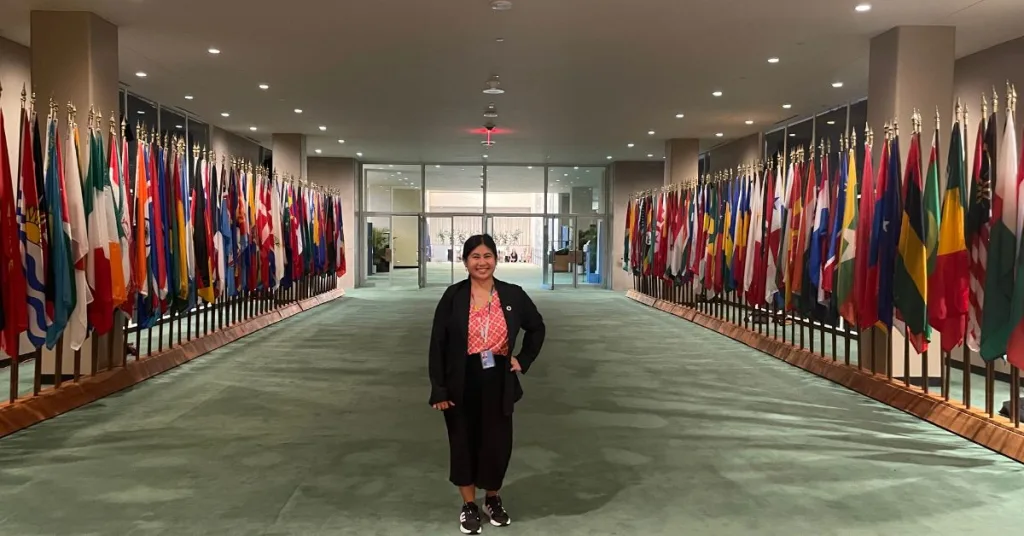In 2019, Christina Samson was living in Madrid and working for the United Nations Sustainable Development Goals Action Campaign (UN SDG Action Campaign) before embarking on an online learning degree.
The 17 Sustainable Development Goals, part of the 2030 Agenda for Sustainable Development, were adopted by the UN and world leaders in 2015. Since then, all member countries have continued to work on ending poverty, fighting inequalities and tackling climate change.
Christina’s role was to communicate the SDGs. She realised that she wanted to “dive deeper and learn more about the topics from a more theoretical and academic standpoint”.
She said: “I wanted it to be flexible so I could continue to do my work and also engage in other activities in my life. And that’s why when I found Edinburgh’s Global Challenges masters that was multidisciplinary, it was a good fit.”
The University has offered online learning since 2005 and currently offers more than 70 degrees. Subjects include business, education, law, health and medicine, and data science.
In those 20 years, more than 10,000 students from over 170 countries have graduated from online programmes.
Melissa Highton, Director of Learning, Teaching and Web Services at the University, says: “Much earlier than many of our competitors, the University recognised the crucial role that online education can play in extending our reach, enabling people from around the globe to benefit from high-quality education and be part of the University community without needing to relocate.”

Breaking barriers
Online learning degrees support the University’s vision of widening access by removing geographical and financial barriers.
Christina was living in Madrid, Spain, when she started the degree. She found the course appealing because she could continue living there while running the non-profit she set up, Madrid For Refugees.
She says: “I would have loved to move to Edinburgh and do an in-person degree, but it wasn’t feasible with my personal, professional and financial situation.
“I didn’t have the luxury to take time off and online learning allows you to study from where you are living. I did cut down my hours at work to give me some more free time during the week and I had a day off a week that I could use to focus on my studies.”
Christina’s first degree was in person at the University of California in Santa Barbara. There was an adjustment period when she undertook an online programme.
“In comparison to an in-person degree, with online learning, it is on you to adapt. Many of us are balancing professional, personal, and family responsibilities, so planning ahead is essential. I recommend blocking out regular time each week for your coursework – especially because some classes have a heavy reading load. The more you put into it, the more you get out of it.”

Career enhancement
Clinical Management of Pain was the first online learning degree that the University offered in 2005. The course aims to tackle the challenges faced by clinicians, with a strong focus on patients and working in practice.
Victoria Park, who runs a master’s in physiotherapy at Robert Gordon University in Aberdeen, was in the first cohort of the pain management degree.
“I was originally working as a physiotherapist managing chronic lower back pain. I was the back pain specialist for our local area and region. The patients who came to see me at the time were experiencing chronic pain. I was looking for a course that would expand my understanding of pain science, physiology and possible opportunities for pain management.
“The course supported my clinical work and opened doors to allow me to get into education and teaching, which is where I am now. I’m the person responsible for teaching the pain curriculum within our physiotherapy course at the university here as well. Things have come a long way since then but it’s given me a lot of the tools that I needed to facilitate that.”

Flexible working
Melissa says there are fewer initial barriers for online learning students: “In times of geopolitical carnage, online distance learners do not need to worry about getting a UK visa, they can continue to work in their profession wherever they live in the world and there’s no need to disrupt their life.
“We know from our data that distance students are typically older than campus masters students, enabling us to extend our knowledge to a much wider audience than we attract on campus.”
Phil Austin, who was living in Durham at the time, was attracted to the course for this reason. He says: “I’m an osteopath originally, and I did the management of pain programme, and from that I went straight on to a PhD at Edinburgh from that master’s. I got into a career of research because of it so I owe a lot to the pain management masters.
“I wouldn’t have been able to do the course if it wasn’t online as I had a young daughter at the time. She was born halfway through the course and she came to the graduation as a one year old.”
Phil now runs the pain management programme at the University of Sydney.

A collaborative experience
Christina believes it is important to build contacts in an online learning degree. She explains: “One of the most enriching aspects of this programme is the opportunity to connect with classmates and faculty from around the world. Everyone is committed to each other’s success.
“In many classes, students started informal WhatsApp groups to share materials, give feedback, and to get to know each other. I’ve made some great friends that way. “In many classes, students started informal WhatsApp groups to share materials, give feedback, and to get to know each other. I’ve made some great friends that way. In a few courses, we even organized Zoom meetups to connect more personally.”
“Don’t be afraid to reach out to people on LinkedIn or via email. Professors are very accessible and often happy to chat one-on-one. These relationships can make the experience so much more rewarding.”
Christina advises those doing an online learning course to assess their life and responsibilities.
She adds: “When you’re in the middle of juggling readings, deadlines, and life, it’s easy to overlook how much you’re learning. I now realise how proud I am of everything I’ve accomplished so don’t be too hard on yourself. Even in a remote learning setting, try to enjoy the process. Absorb what you can, celebrate small wins, and appreciate the journey.”
Photo credits: Christina Samson and University of Edinburgh New College image by Tomas Sereda





